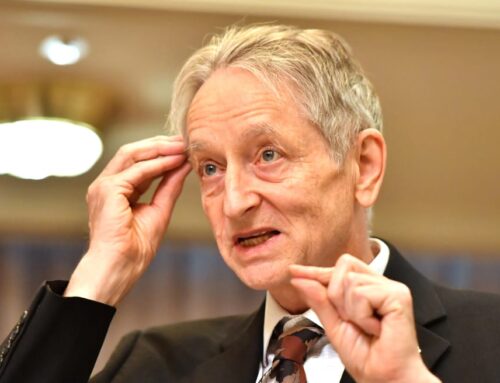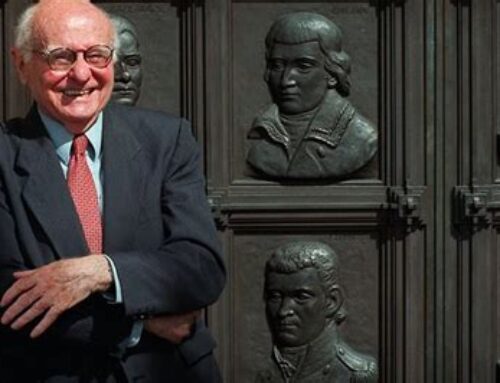Niels Bohr talked about the difference between truth and deep truth. Now, that’s intriguing! Does this mean there’s such a thing as quantum truth?
A few days ago, my PhD supervisor, Professor John Keane, told me what Niels Bohr had to say about truth. Bohr, John said, talked about the difference between truth and deep truth. Now, that’s intriguing! Indeed, Bertrand Russell once said, “the question ‘What is truth?’ is one which every philosopher ought to face.” Given that countless philosophers have engaged with quantum mechanics, it’s strange that the relationship between quantum theory and ‘truth’ has been largely ignored. In fact, no one has yet written a book specifically on the subject. If that piques your interest, you’ll be pleased to know the pithy titles: ‘Quantum Truth’ and ‘The Quantum of Truth’ are both still available.
So, what is quantum truth? Before we bite into that meaty subject, it’s worth surveying what is taken for ‘normal’ (or, classical) truth. As it stands, there are a number of philosophical positions on truth, including: equivalence theory; correspondence theory; coherence theory; objectivist theory; constructivist theory; and, pragmatic theory.
Equivalence theory treats truth as a condition between two statements, without reference to anything outside of the language game. Correspondence theory identifies truth with the relation between a statement and a fact. If the statement matches the fact, it’s true. Objectivist theory claims truth is something to be found in the world around us. The law of gravity is considered an objective truth. Constructivist theory maintains that truth is produced by actors and their structures. The food pyramid is considered a constructed truth for a particular cultural context. Pragmatic theory equates truth with what works best, at the time. Fifteenth century navigation was true, at the time, insofar as it promoted the ‘discovery’ of the New World.
This list of truth understandings is by no means exhaustive, and people commonly adopt a combination of kinds of truth when they go about their daily lives. So, when I decide to buy toothpaste I assume the scientists know what the chemical ingredients do (based on the objective truth of chemical properties), I buy the latest formulation (since, pragmatically, it’s the one that works best today), and it happens to be the brand from the TV commercials (since I’m culturally constructed to believe marketing claims).
OK, so much for classical truth. What about quantum truth? Well, if we ask the quantum physicists themselves, they don’t seem overly convinced quantum has a unique perspective on truth. Werner Heisenberg, for one, seemed fairly comfortable with the conventional scientific approach to truth: that truth is a pragmatic search for objective facts about the universe. Albert Einstein, for his part, sorted truth into three fields: scientific, experiential, and mathematical. Erwin Schrödinger, although he thought there were deep, mystical truths about the universe, didn’t believe quantum physics held the answers. David Bohm even went as far as to say, “there is no reason to believe that quantum theory is an ultimate truth.”
These frustrating avenues return our search for quantum truth to its initial inspiration: my professor’s tantalising suggestion to investigate Niels Bohr’s approach to truth. Was Bohr’s deep truth, quantum truth? Finding the passage in Bohr’s collected essays, Atomic Physics and Human Knowledge, I was, predictably, conflicted:
“In the Institute in Copenhagen, where through those years a number of young physicists from various countries came together for discussions, we used, when in trouble, often to comfort ourselves with jokes, among them the old saying of the two kinds of truth. To the one kind belong statements so simple and clear that the opposite assertion obviously could not be defended. The other kind, the so-called “deep truths,” are statements in which the opposite also contains deep truth. Now, the development in a new field will usually pass through stages in which chaos becomes gradually replaced by order; but it is not least in the intermediate stage [of the “development in a new field”] where deep truth prevails that the work is really exciting and inspires the imagination to search for a firmer hold… through a singularly fruitful cooperation of a whole generation of physicists we are nearing the goal where logical order to a large extent allows us to avoid deep truth.” (emphasis added).
It turns out that deep truth isn’t a destination, it’s a weigh-station. A productive and fruitful weigh-station, but a midway point, nevertheless. Bohr’s deep truth is a context – or, better yet a state. Deep truth is truth in superposition, before the collapse of the potentialities of the cognitive wave function and the orderliness and certainties of our classical mindset.
It’s really hard to work out if Bohr is melancholy or glad that we, “avoid deep truth.” For one thing, his description of deep truth sounds like everything you could possibly want from a state of enquiry: “really exciting and inspires the imagination.” For another, the “logical order” Bohr describes taking the place (or collapsing the state) of deep truth seems antithetical to everything Bohr has ever written about epistemology, and, in particular, his theory of complementarity. Under complementarity, of course, disorder is a necessary condition of knowledge.
Here’s my take: quantum truth really isn’t a thing.
Truth is a concept that has been designed, theorised, and philosophised for the classical world. At best, quantum makes some of the criteria for classical truth less certain. For example, many quantum experiments undermine the ontological certainties that classical physics relies upon: things like determinism, causation, and time-space coordination. But, that’s not a positive claim for truth. That’s forcing classical physics to reconsider the content and foundation of its truth. Not to mention, the basis we have for saying, ‘quantum physics is the best (i.e., most true) explanation we have of subatomic phenomena,’ is entirely synonymous with the pragmatic and objectivist approaches to truth, discussed above.
It’s often said nowadays, ‘we live in a post-truth’ world. Well, on that front, perhaps quantum can be somewhat of an antidote. I’m going to dive back into Bohr’s evocation of deep truth as the state before the orderliness of logic has refined our thinking into (just plain, ordinary) truth. I suggest thinking about quantum truth as ‘pre-truth.’ It’s that state of affairs before we’ve forced ourselves into deciding in favour of truth or falsity. Quantum pre-truth is that moment when everything is still possible, when nothing has been decided, and no one is yet fighting over which truth is the most true, and which truth the most false.
In a world where people storm Capitols and refuse vaccines on the basis of post-truth, while, on the other hand we’re told large corporations have our ‘best interests’ at heart and fight for social justice, on the basis of true-truth – (consider the awkward alignment between corporate interests and BLM when Walmart and Target’s business models are based upon a low minimum wage subsidised by welfare programs) – perhaps we could all do with a dose of pre-truth, if for no other reason than to take the temperature down a little.







Leave a Reply